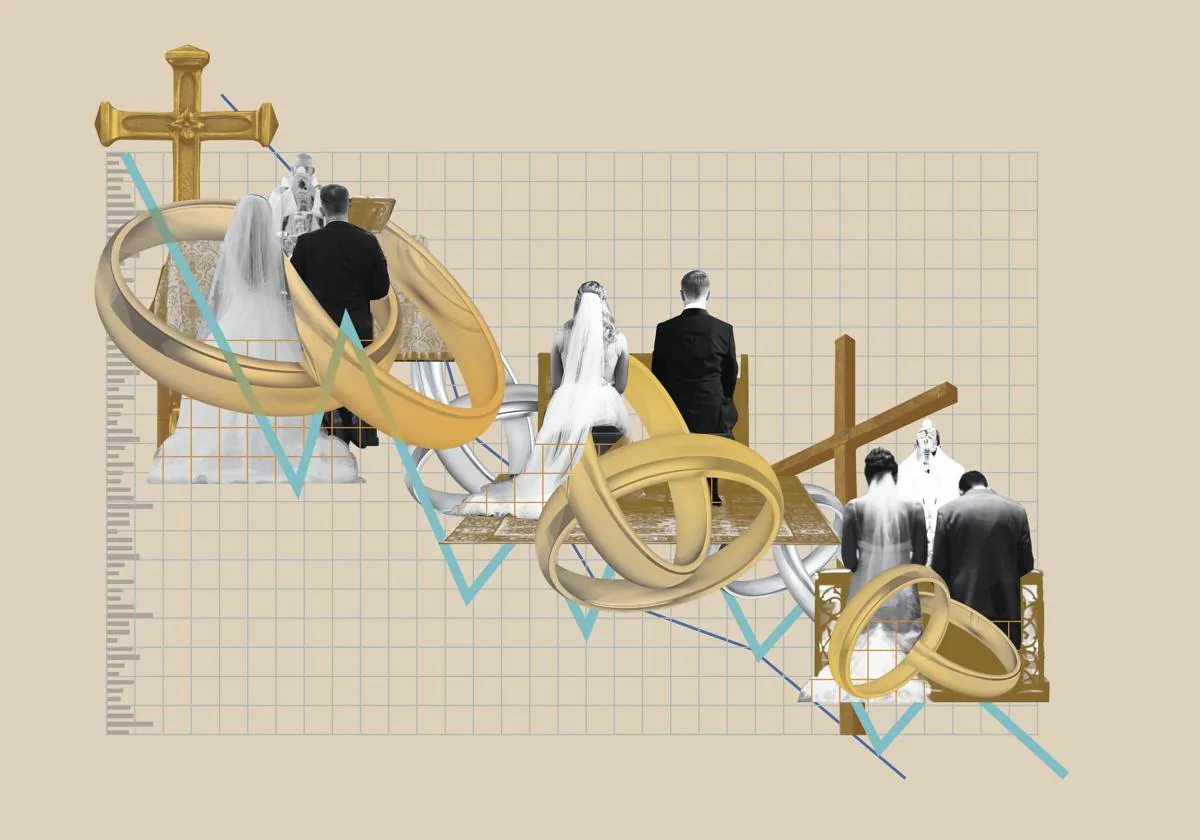Why does only one in five weddings in Malaga take place in a church?
According to the latest figures some 18.4 per cent of all weddings in the province were Catholic, a drop of 54 points from 1993; a decline over the last three decades that is also noticeable in baptisms
Just a few decades ago, civil weddings were uncommon in Spain and were even frowned upon in certain social sectors. The social and cultural evolution of Spanish society has meant that today church weddings are more uncommon.
In a general context of a decline in the number of marriages in the country, the fall in the number of Catholic weddings is striking. The general fall is reflected in Malaga, where today just one in five marriages takes place in front of an altar and with the blessing of a priest.
In 1995, seven out of every ten marriages in Malaga (72.70%) were Catholic, while in 2022, the latest official data, it stood at 18.42% of the total number of weddings to take place in the province, which represents a drop of 54 points. In these three decades, according to a comparison of the official figures consulted by SUR from Spain's National Statistics Institute (INE) on the total number of marriages and those of the Diocese of Malaga on marriages, the fall has been constant.
In the 1990s and the early 2000s, Catholic weddings in Malaga were still above 50%. The turning point came in 2004, when it fell to 38.8%, and although it went up again the following year (53.2%), since then the number of church weddings has always been below half of those that take place annually in the province.
Leaving aside 2020, when as a result of the pandemic the number of weddings in general and of Catholic ones (there were 282) in particular, and 2021, a year in which the effects of the Covid-19 health crisis were still felt, 2022 was the year with the lowest percentage of church weddings in the province with respect to the total number of marriages. Of the 6,708 marriages that took place, only 1,236 were Catholic.
In the last three decades, the number of children being baptised by the Catholic church has also dropped sharply. In 1995, eight out of every ten babies born (84.11%) in the province were baptised, while in 2022 it was 46.31%. With the exception of 2020, the lowest number of Catholic baptisms in recent years was recorded in 2017 when the number stood at 34.43%, according to official data.
Secularisation
What are the causes behind this drop in numbers? From an academic and religious point of view, experts consulted agree that the main factor is the secularisation of society. "The clear observation, which is surely behind this phenomenon of the decline in Catholic marriages, is the marked process of secularisation of Spanish society that began to take place at the end of the 1970s, which by the end of the 1990s was already significant and which has been 'in crescendo' in the new century," according to Luis Ayuso, professor of Sociology at the University of Malaga (UMA) and a specialist in the family sociology.
"Western society no longer lives in a system of sociological Christianity. It is no longer consubstantial to the person in Spain to be Catholic," said Francisco Javier Guerrero García, episcopal vicar for Evangelisation in the Diocese of Malaga.
The priest added other reasons for the decrease, "The ageing population; the loss of the transmission of the faith in the family context: there is still faith, but there is no commitment to religion; the mistrust of the Church due to the scandals of some of its members; the use of a language that does not connect with the current cultural language; the feeling that the institution has lost its identity as a Catholic institution; the lack of a sense of belonging to the Church; the lack of a sense of belonging to the Catholic Church; the lack of a sense of belonging to the Church; the lack of a sense of belonging to the Church as an institution: the sensation that the institution has distanced itself from the debates that interest society, especially the younger generations; and we are witnessing a hegemony of ideological currents that consider Christianity an enemy and that have managed, on many occasions, to dominate the social discourse."
Ayuso argued that the drop is "much greater" because in a general context where there has been "a collapse" in weddings and births, there has been a parallel secularisation. "What this suggests is that there is an important change of values in Spanish society, which are following the path of an intense process of secularisation. Religion is still very present because we have a lot of popular religious celebration, but it is not important for this type of rituals, rites of passage as anthropologists say, which were all previously under a religious logic and which have now become secularised," he added with respect to marriages and baptisms.
The Sociology professor considers that this decrease in Catholic marriages cannot be attributed to aspects such as the increase in immigration or gay marriages. With regard to the former, he maintains that if we analyse the migratory phenomenon, "people who come from other countries are much more religious than those from here," he said referring especially to those from Latin America, who are mainly Catholics.
Meanwhile, with regard to same-sex marriages, the percentage is "very low". In 2022 there were 264 same-sex marriages in Malaga - 4% of the total. On this point, Ayuso stresses that there is a "very high social tolerance" towards same-sex couples, "another symptom of this process of secularisation", which, in his opinion, is generational.
This situation is both a cause of concern for the Catholic Church and a challenge. "The concern exists, at the same time as it obliges us to see it as a challenge and to seek new methods for people to get to know Jesus Christ," argued Guerrero García, who stressed that the loss of the faithful and the fall in the number of weddings and baptisms means that "now only those who want to do so freely, without any kind of social pressure" do so.
"The recent popes have already predicted that the church of the future will be small communities of people. We will have to get out of this massive church, even if this sometimes tempts us to nostalgia", and instead have one where "people remain connected to Jesus Christ and to the Gospel".
Guerrero García added, "But we remain calm: the church has been alive for more than 2,000 years. It has come through all crises, some much more serious than today, and, both outside Europe and in popular religious celebration, the church is still very much alive. And in our diocese of Malaga there are still many embers of faith, popular religion and commitment to others, especially the poorest," he remarked.
To try to recover, the Church is working on a new process of evangelisation which, in the words of Francisco Javier Guerrero García, involves strengthening its role because today we need Christians "with a personalised faith, people who have made a personal choice of Christian faith", by taking "great care of Christian families so that they can be transmitters of the faith at home".
Fewer communions but religious funerals are still high in numbers
The number of children receiving their first communion in Malaga has also dropped significantly over the last three decades, where the effect of secularisation is coupled with the fact that there are fewer births and, consequently, a decrease in the number of youngsters reaching the age to receive their first communion. Meanwhile religious funerals are still high in numbers.
Publicidad
- 1 Torremolinos swings open the doors of its Christmas winter wonderland park
- 2 Larios terminates 400 land lease agreements on eastern Costa del Sol as plans for tourism complex advance
- 3 Mijas tornado leaves at least half a million euros of damage in its wake
- 4 Torremolinos to install speed-deterrent radar on stretch of road with high accident rate
- 5 An Anglo-Spanish Christmas in rural Andalucía for popular British TV show
- 6 Beat Live will bring Craig David, UB40 and Two Door Cinema Club to Marbella Arena next summer
- 7 The foreign menace: now available in the hotel lobby
- 8 Five-star ME Meliá Málaga hotel opens with financial backing from footballer Gerard Piqué
- 9 Malaga metro works held up for nine months after surprise Roman necropolis find in city
- 10 Work starts on new 13-million-euro water supply pipeline between Benalmádena and Torremolinos
-
Publicidad
Publicidad
Publicidad

